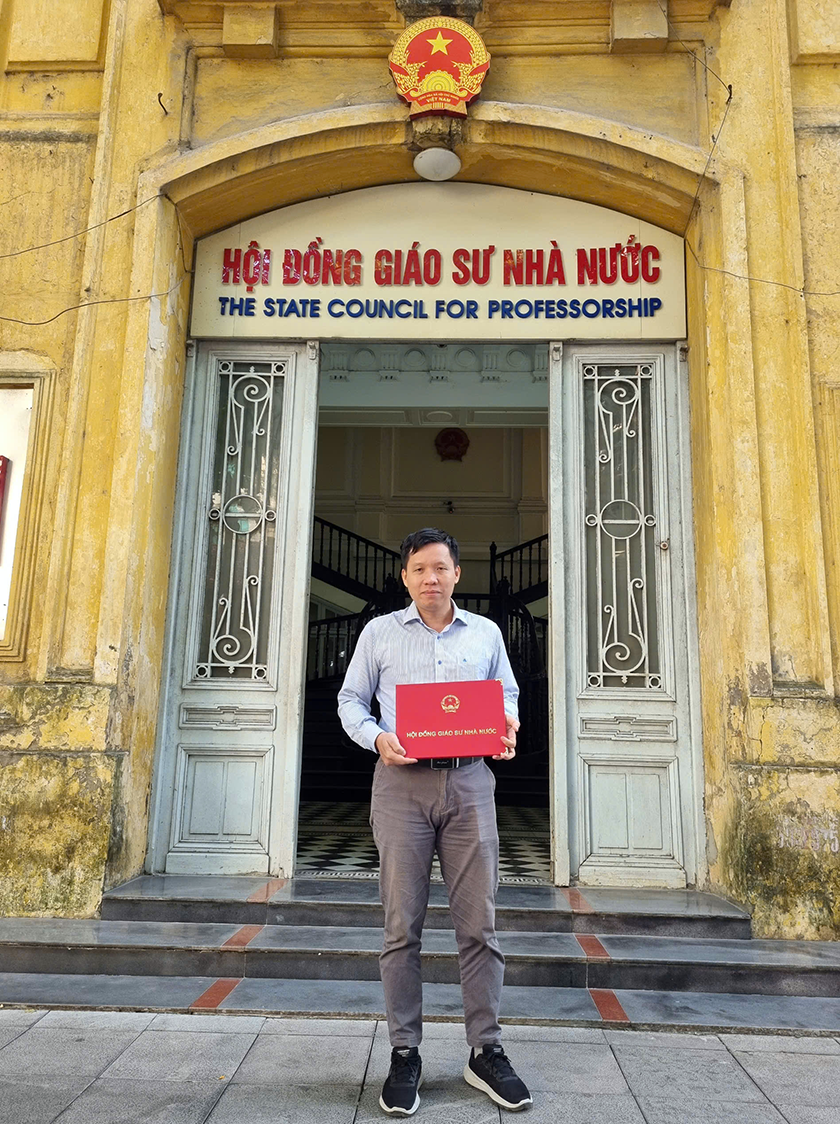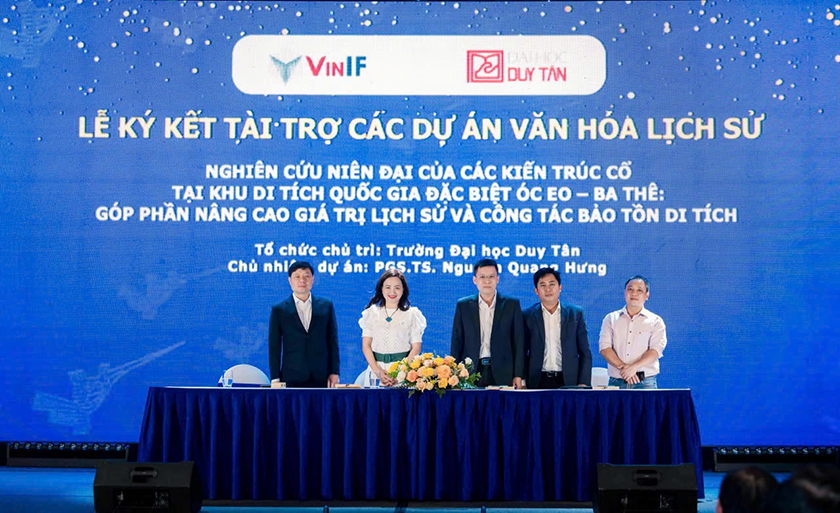The State Council for Professorship officially recognized 614 educators as meeting the criteria for professorial titles in 2024 - 45 professors and 569 associate professors. Assoc.Prof. Dr Nguyen Quang Hung, Director of the DTU Institute of Fundamental & Applied Sciences (IFAS), is among the 45 to receive the title of professor.
Leading a research direction, influencing and contributing to the scientific community
The title of professor is awarded for extraordinary and continuous work in the candidate’s field of expertise or research discipline.
According to Prof. Hung, “Besides the general criteria for the title of professor, one truly important condition - and especially for young candidates in physics - is to lead a research direction, be influential at least within your narrow research area, and have clear contributions to the scientific community.”

Prof. Hung received a certificate of the title of professor in physics in 2024
With a clear goal and the determination to pursue his passion, Prof. Hung has achieved many accomplishments throughout his scientific research career:
- member of the Nafosted Scientific Committee for Physics since 2017;
- published a total of 96 scientific papers, 35 of which as lead author in prestigious international scientific journals since becoming associate professor;
- completed four Nafosted-funded research projects, published one monograph used as educational material at DTU, and supervised two PhD students who successfully defended their dissertations;
- led two applied-science training & research programs that were implemented at DTU.
During his career, Prof. Hung has received several awards:
- Young Researcher prize from the Vietnamese Theoretical Physics Society in 2012;
- a letter from the Minister of Science & Technology praising a 2017 publication in the prestigious international journal Physical Review Letters, saying that, “The paper is specially meaningful to nuclear physics research in Vietnam and a source of pride for basic science in Vietnam”;
- nominated twice consecutively by Nafosted for the Ta Quang Buu Award: in 2019 and 2020.
Prof. Hung obtained his bachelor’s degree in Physics, minor in Nuclear Technology, from the University of Science of the Vietnam National University Hanoi in 2003. He earned a master’s degree at the same university and then pursued full-time doctoral research at the Japanese RIKEN Institute of Physical & Chemical Research with an Asian Program Associate scholarship.
Prof. Hung has been working at DTU since late 2015 and officially assumed the role of Director of the DTU Institute of Fundamental & Applied Sciences in 2017, where he has overseen many successful training and research activities and earned societal recognition.
Quality research shaping a strong research team
Prof. Hung started to research the theory of the structure of excited nuclei (“hot nuclei”) during his doctoral studies, and after he earned his PhD, he has opened many useful avenues of in-depth research in nuclear physics and later also in archaeology.
In the early stages in 2017, Prof. Hung and his coworkers succeeded in building a microscopic theoretical model that simultaneously describes the level densities and radiation strength functions of hot nuclei. This theoretical model was further developed and used to explain the latest experimental data. In this line of research, he led four Nafosted-funded fundamental research projects in physics, including the strong-research-team project “Developing a unified microscopic theoretical model describing nuclear structure at zero temperature and at non-zero temperature and angular momentum, taking into account the exact solution to the pairing problem” running from 2020 to 2023.
Prof. Hung then expanded his research into experimental nuclear physics, specifically the study of nuclear excitation levels from thermal neutron capture reactions from the nuclear reactor in Dalat. During this line of research, the team published experimental data obtained completely in Vietnam and by Vietnamese scientists in prestigious international journals. Notably, in a 2019 publication in Physical Review C (a leading journals in nuclear physics), the entire level data of the 153Sm nucleus passed review by nuclear data experts and was subsequently included in the international nuclear database of the National Nuclear Data Center (NNDC), managed by the Brookhaven National Laboratory (BNL).
With their research on nanomaterials and specifically on the application of nuclear spectroscopic systems to the study of structural changes and defects in materials, Prof. Hung and his coworkers have published a series of results in highly prestigious international journals, such as Langmuir (2022), Chemical Engineering Journal (2022), ACS Applied Materials & Interfaces (2023), Solar RRL (2024), and Small Methods (2024). “Our research has provided researchers with information on the deep internal structure of nanomaterials that many traditional methods don’t have access to,” Prof. Hung explains. “In this line, I’m currently leading the Nafosted-funded strong-research-team project ‘Studying structural defects and modifications in nanomaterials using nuclear methods’ running from 2024 to 2028.”

Prof. Hung at the VinIF funding signing ceremony
Most recently, after exploring the use of thermoluminescence and nuclear techniques to date certain archaeological sites in Vietnam, Prof. Hung and his coworkers developed an improved thermoluminescence method that combines field experiments, laboratory measurements, and computer simulations to accurately date certain ancient structures with heterogeneous, multilayered, and overlapped age characteristics at the special national site of Oc Eo/Ba The in An Giang province. Their research results have opened a new way of dating ancient structures in Vietnam, and Prof. Hung is co-leading the project “Research on dating ancient structures at Oc Eo/Ba The special national site: Contributing to enhancing historical value and preservation of heritage sites”, funded by the VinIF Fund.
Challenges as a young scientist’s motivation to prove capabilities
The research achievements of many young Vietnamese scientists are making significant contributions to the industrialization and development of the country. Today’s young scientists also enjoy many advantages as basic and experimental scientific research is being given attention and attracting investment.
“Compared to the generation before us, young scientists today have a quite favorable research environment,” Prof. Hung explains. “A great many universities and research institutes are highly committed to scientific research and are willing to offer competitive salaries to scientists with good research capabilities. Numerous funding sources -institutions, ministries, Nafosted, the VinIF, the government… - are always available for outstanding young scientists who can demonstrate their competence.
“Alongside these advantages, though, young scientists also face challenges, particularly when competing for funding from various research funds against the many young scientists returning from overseas studies. Finding undergraduate students, graduate students, and PhD students to join research teams is growing ever more difficult, especially in the fundamental sciences like physics, mathematics, and chemistry. Maintaining a research career therefore requires young scientists to work without pause, always seek new knowledge, and engage in regular academic exchange with prominent research centers and scientists all over the world. They should also pay attention to the interdisciplinary nature of their research, as this is crucial to solve big problems.”
Having worked at DTU for exactly nine years, Prof. Hung has much to appreciate: “What I appreciate most is that I’m free to research anything I like and the university is always willing to provide the best and quickest support for my research, from time and laboratory facilities to recruiting researchers, PhD students, and postdocs for my research projects.”
(Media Center)